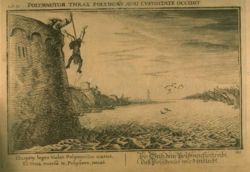
Polymestor
Encyclopedia

Greek mythology
Greek mythology is the body of myths and legends belonging to the ancient Greeks, concerning their gods and heroes, the nature of the world, and the origins and significance of their own cult and ritual practices. They were a part of religion in ancient Greece...
, Polymestor was a King of Thrace
Thrace
Thrace is a historical and geographic area in southeast Europe. As a geographical concept, Thrace designates a region bounded by the Balkan Mountains on the north, Rhodope Mountains and the Aegean Sea on the south, and by the Black Sea and the Sea of Marmara on the east...
. His wife was Ilione, the eldest daughter of King Priam
Priam
Priam was the king of Troy during the Trojan War and youngest son of Laomedon. Modern scholars derive his name from the Luwian compound Priimuua, which means "exceptionally courageous".- Marriage and issue :...
. Polymestor appears in Euripides' play, Hecuba
Hecuba (play)
Hecuba is a tragedy by Euripides written c. 424 BC. It takes place after the Trojan War, but before the Greeks have departed Troy . The central figure is Hecuba, wife of King Priam, formerly Queen of the now-fallen city...
and in the Ovid
Ovid
Publius Ovidius Naso , known as Ovid in the English-speaking world, was a Roman poet who is best known as the author of the three major collections of erotic poetry: Heroides, Amores, and Ars Amatoria...
ian myth "Hecuba, Polyxena and Polydorus"
Polymestor was also a Greek king of Arcadia
Arcadia
Arcadia is one of the regional units of Greece. It is part of the administrative region of Peloponnese. It is situated in the central and eastern part of the Peloponnese peninsula. It takes its name from the mythological character Arcas. In Greek mythology, it was the home of the god Pan...
.
During the Trojan War
Trojan War
In Greek mythology, the Trojan War was waged against the city of Troy by the Achaeans after Paris of Troy took Helen from her husband Menelaus, the king of Sparta. The war is among the most important events in Greek mythology and was narrated in many works of Greek literature, including the Iliad...
, King Priam
Priam
Priam was the king of Troy during the Trojan War and youngest son of Laomedon. Modern scholars derive his name from the Luwian compound Priimuua, which means "exceptionally courageous".- Marriage and issue :...
was frightened for his youngest son Polydorus
Polydorus
In Greek mythology, Polydorus referred to several different people.*An Argive, son of Hippomedon...
's safety since Polydorus could not fight for himself. Priam sent the child, along with gifts of jewelry and gold, to the court of King Polymestor to keep him away from the fighting. After Troy fell, Polymestor betrayed Priam and threw Polydorus into the ocean in order to keep the treasure for himself.
Hecuba
Hecuba
Hecuba was a queen in Greek mythology, the wife of King Priam of Troy during the Trojan War, with whom she had 19 children. These children included several major characters of Homer's Iliad such as the warriors Hector and Paris, and the prophetess Cassandra...
, Polydorus' mother, found the body and discovered the treachery. She asked Agamemnon to bring Polymestor to her. Agamemnon complied, motivated by the love of Cassandra
Cassandra
In Greek mythology, Cassandra was the daughter of King Priam and Queen Hecuba of Troy. Her beauty caused Apollo to grant her the gift of prophecy...
, another of Hecuba's children. Hecuba baits Polymestor by drawing him in with treasure. Hecuba has the other Trojan women kill Polymestor's sons, and blinds Polymestor by scratching his eyes out. Polymestor is humiliated at having been blinded and made childless at the hands of slave women. Polymestor is given a trial against Hecuba by Agamemnon. Polymestor claims to be working in the Greek's interest by killing Polydorus before he avenges his brothers and father. Hecuba refutes this claim by stating that Greece has no interest in allying with barbarians. Agamemnon sides with Hecuba and declares Polymestor's actions to be murder. Agamemnon has his soldiers seize Polymestor. As he is being taken away, Polymestor reveals the deaths of Hecuba and Agamemnon
Agamemnon
In Greek mythology, Agamemnon was the son of King Atreus and Queen Aerope of Mycenae, the brother of Menelaus, the husband of Clytemnestra, and the father of Electra and Orestes. Mythical legends make him the king of Mycenae or Argos, thought to be different names for the same area...
.

